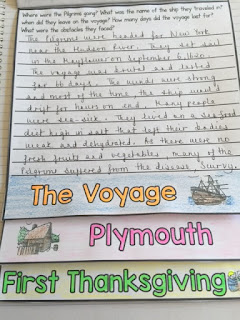By Teach To Tell
Grades 3-6
Flipbooks are undeniably known for their versatility. They scaffold the structure of a piece of writing, be it a persuasive, narrative, biography or an informative report. Needless to say, they are also a handy visual tool, and look simply impressive.
They can be used for just about any subject or topic:
1. Scaffolding the structural components of a writing genre.
2. Helping students organize/organise their writing in an Informative Report.
3. Writing a Book Report.
Interestingly, the templates other than scaffolding structural elements, also serve as a means of collating information in addition to drafting and editing.
Once students have edited their writing for accuracy then they can refer to their flipbook when publishing.
The templates also serve a dual purpose. Other than compiling them to create a flipbook, they can also be glued into an Interactive Notebook.
If creating a flipbook, the templates simply need to be stapled at the top.
The interactive notebook requires gluing at the top tabs after arranging in descending order. The last template is glued down first, followed consecutively by the rest.
Preparing the flipbook templates take a reasonable amount of effort, but the finished product is worth the time spent.
I have my students first cut out and assemble the templates to compile the flipbook. Then they work at their own pace researching and finishing each section. This will be their first draft.
Once all sections of the flipbook are completed, students use the checklists to self-edit and peer-edit.
Finally, students publish their research on lined publishing sheets. They refer to the edited information collated in their flipbooks.
A teacher marking rubric will help you assess students' completed flipbooks for structural components and content.
Once all students have completed their research flipbooks, they look truly impressive displayed on the bulletin board. Be ready to receive many compliments from others.
The following notable women in history are featured in these editable templates:
Helen Keller, Oprah Winfrey, Charlotte Bronte, Billie Jean King, Mother Teresa, Queen Elizabeth II, Elizabeth I, Princess Diana, Catherine Middleton, Amelia Earhart, Anne Frank, Florence Nightingale, Joan of Arc, Marie Antoinette, Malala Yousafzai, Ellen Johnson Sirleaf, Indira Gandhi, Cleopatra, Eva Peron, Catherine the Great and Frida Kahlo.


Grades 3-6
Flipbooks are undeniably known for their versatility. They scaffold the structure of a piece of writing, be it a persuasive, narrative, biography or an informative report. Needless to say, they are also a handy visual tool, and look simply impressive.
They can be used for just about any subject or topic:
1. Scaffolding the structural components of a writing genre.
2. Helping students organize/organise their writing in an Informative Report.
3. Writing a Book Report.
Interestingly, the templates other than scaffolding structural elements, also serve as a means of collating information in addition to drafting and editing.
Once students have edited their writing for accuracy then they can refer to their flipbook when publishing.
If creating a flipbook, the templates simply need to be stapled at the top.
The interactive notebook requires gluing at the top tabs after arranging in descending order. The last template is glued down first, followed consecutively by the rest.
Preparing the flipbook templates take a reasonable amount of effort, but the finished product is worth the time spent.
I have my students first cut out and assemble the templates to compile the flipbook. Then they work at their own pace researching and finishing each section. This will be their first draft.
Once all sections of the flipbook are completed, students use the checklists to self-edit and peer-edit.
A teacher marking rubric will help you assess students' completed flipbooks for structural components and content.
Once all students have completed their research flipbooks, they look truly impressive displayed on the bulletin board. Be ready to receive many compliments from others.
Want to try the versatility of flipbooks by getting exclusive access to biography editable flipbooks on 20 notable women of history? These templates will help your students document their research and scaffold the writing of a biography. Checklists and teacher marking rubrics also included - perfect activity for your students to do during Women's History Month in March.
Helen Keller, Oprah Winfrey, Charlotte Bronte, Billie Jean King, Mother Teresa, Queen Elizabeth II, Elizabeth I, Princess Diana, Catherine Middleton, Amelia Earhart, Anne Frank, Florence Nightingale, Joan of Arc, Marie Antoinette, Malala Yousafzai, Ellen Johnson Sirleaf, Indira Gandhi, Cleopatra, Eva Peron, Catherine the Great and Frida Kahlo.
Get access by clicking on the image below:

Happy teaching!
Until next time...





















No comments:
Post a Comment